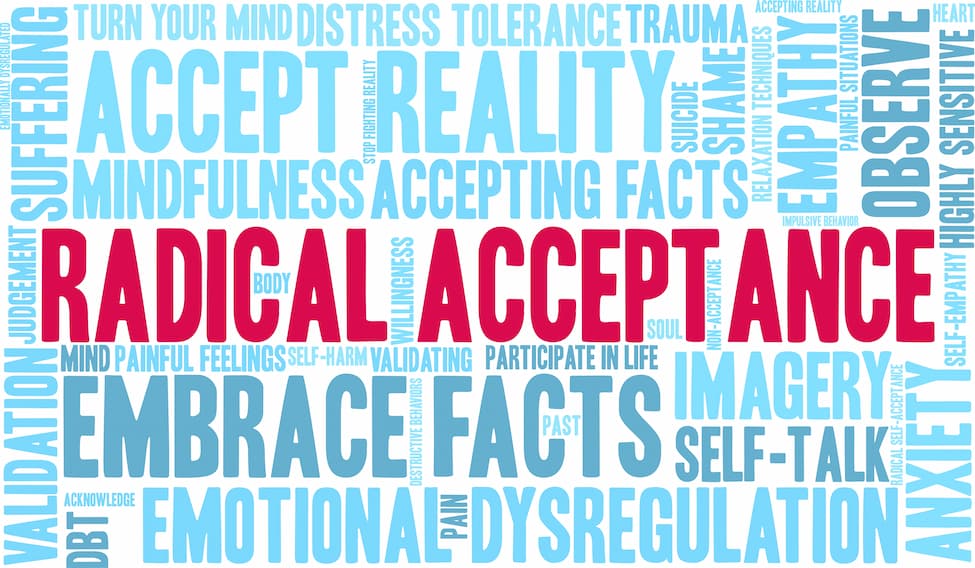If you are struggling with addiction and co-existing disorders, a radical acceptance approach could help you cultivate a healthier mindset Ö Continue reading What Is Radical Acceptance? How Radical Acceptance Can Help Treat Trauma ? The post What Is...
 Radical acceptance is increasingly being integrated into substance use recovery plans, but what is radical acceptance, and how does it help address addiction disorders? Here is what you need to know.
Radical acceptance is increasingly being integrated into substance use recovery plans, but what is radical acceptance, and how does it help address addiction disorders? Here is what you need to know.
If you are struggling with addiction and co-existing disorders, a radical acceptance approach could help you cultivate a healthier mindset as you pursue sobriety.
The radical acceptance theory is based on the idea that suffering does not necessarily arise from pain, but rather from adherence to it. It originates from Buddhist philosophy and the psychological paradigm advocated by Carl Rogers that accepting oneís situation is the first step to change.
What Is Radical Acceptance?
Pretending that we donít have emotional responses to distressing situations can become an emotional response in itself. This type of suppression can lead to resentment and even extended suffering. Radical acceptance is the ability to accept painful circumstances without judging them or resisting them.
Understanding what cannot be altered is essential to mitigating emotional pain. Radical acceptance is a part of a type of therapeutic intervention called dialectical behavioral therapy, often used to address post-traumatic stress disorder. The objective is to recognize your pain and sorrow for what they are: feelings that can be processed mindfully. So, instead of attaching yourself to your traumatic experiences, radical acceptance promotes detaching yourself from the source of your suffering. This concept is known as nonattachment.
Nonattachment does not involve suppressing feelings; it is a technique for feeling pain without progressing to extended suffering. This emotional awareness approach empowers you with the tools you need to overcome the symptoms of psychological trauma.
Radical acceptance involves learning to differentiate between the emotional reaction and the event that caused the pain. It does not advocate automatically replacing the emotional response with approval; it is a process that allows people to cope with circumstances that cannot be changed.
Learning to Accept Reality
Radical acceptance is not an easy process. Rather, because you are effectively undoing decades of negative impulses, it might take years to adjust to this new approach.
Radical acceptance is typically practiced in instances when you do not have the power to repair or undo an event. Such an event might be the sudden death of a loved one or the end of a relationship.
Although sorrow and frustration are natural responses to unpleasant situations, prolonged misery occurs when the original distress is sustained due to an unwillingness to accept what has occurred.
Radical acceptance is particularly challenging to adopt in times of extreme tragedy and distress. However, allowing negative emotions to go unchecked will only intensify lingering sadness. Whether you suppress your unhealthy emotions or fixate on them, you put yourself in danger of perpetuating your emotional trauma.
Radical Acceptance vs. Forgiveness
Forgiveness and radical acceptance are often viewed as synonymous terms. However, they are actually very different concepts. Forgiveness involves reconciliation with a person or that personís actions; radical acceptance is entirely personal. Whether you have been traumatized by an event or the actions of a particular person, the principles of acceptance are the same.
But how do you know you need radical acceptance?
Symptoms of Nonacceptance
Certain thought patterns are clear indications of nonacceptance. Nonacceptance sentiments include the following:
The situation is impossible to cope with. The situation is unfair. The situation shouldnít happen to someone like me. This kind of situation only happens to me. This situation is unacceptable. I will never get over this situation.It is very easy to sink into an attitude of nonacceptance when circumstances become extremely difficult. This phenomenon is largely due to the impulse to push back on challenges. After all, if we accept injustices, does that mean we agree with them?
Emotional acceptance isnít the same as complacency. If you were the victim of an assault, crime or another major transgression, you donít have to forgo pursuing restitution. However, certain situations merit radical acceptance because any other response would more than likely result in negative outcomes. For example, suppose you cannot articulate why you are unable to move beyond your anger. In that case, if you dwell on painful situations to the point where you donít feel joy, or if you are losing friendships because you cannot let go of your resentments, radical acceptance might be appropriate.
Radical acceptance does not imply passivity or submission. Instead, it is a mindful effort to reevaluate your circumstances dispassionately and with emotional awareness. You make the deliberate choice to change your worldview.
The purpose of radical acceptance is to come to a place where you can visualize the ways you might proceed under your circumstances. This approach can be especially useful if you struggle with a substance use disorder. While it might not seem as though you have an abundance of options, you could choose to pursue recovery because your life has value. In essence, transitioning from negative to positive impulses is at the root of radical acceptance.
At The Raleigh House, we view†trauma treatment†as an essential part of recovery from substance use disorder. We offer a team of dual diagnosis specialists with in-depth expertise in mental health disorders and how they accelerate drug and alcohol misuse.
If you wish to begin your recovery journey, please†contact our helpful representatives†today.
The post What Is Radical Acceptance? How Radical Acceptance Can Help Treat Trauma appeared first on The Raleigh House.










